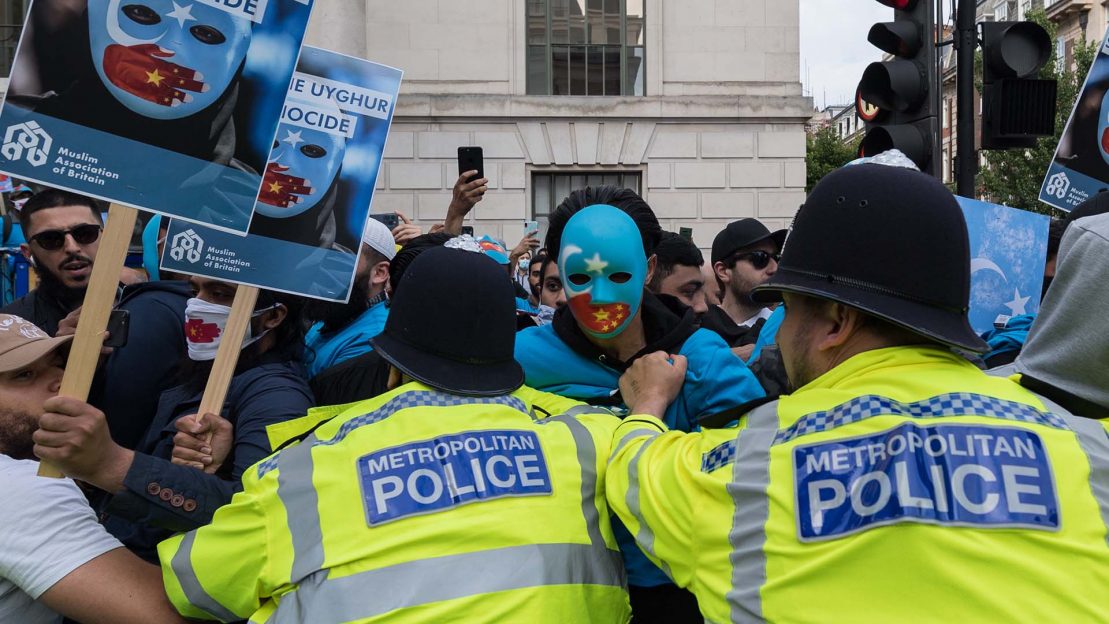By Turkistan Times | October 18, 2025
A new United Nations report has raised serious concerns about China’s expanding campaign of transnational repression and the continuing persecution of Uyghurs and other ethnic minorities, both within and beyond its borders.
The Annual Report of the United Nations High Commissioner for Human Rights, published this week, documents how Beijing has targeted human rights defenders, dissidents, and members of persecuted communities living overseas through surveillance, intimidation, and forced repatriations. The report also details ongoing human rights violations inside China, particularly in East Turkistan, Tibet, and Hong Kong, highlighting severe restrictions on freedom of expression, religion, and movement.
According to the UN Office of the High Commissioner for Human Rights (OHCHR), Chinese authorities have engaged in cross-border operations that violate international law, often using bilateral security arrangements or informal networks to pursue individuals who fled repression. These actions, the report warns, “undermine global norms protecting refugees and exiles” and threaten the independence of international human rights institutions.
Read the full OHCHR report here.
East Turkistan at the Core of Beijing’s Control Strategy
While the UN document surveys human rights conditions worldwide, its findings on China reaffirm long-standing fears that the Chinese Communist Party (CCP) has institutionalized repression in East Turkistan under the guise of “counterterrorism” and “poverty alleviation.”
Rights groups and independent researchers have documented the mass internment of Uyghurs, with more than one million people believed to have been detained in political reeducation camps since 2017. Many of those released from detention were reportedly transferred into forced-labour programs tied to state-run factories and agricultural collectives.
International investigations — including those by the U.S. Department of State, the Uyghur Tribunal in London, and several European parliaments — have described these abuses as crimes against humanity or genocide. The Chinese government continues to deny the allegations, insisting that the facilities are “vocational training centers.”
The UN High Commissioner’s report echoes these concerns, noting “persistent patterns of arbitrary detention and systematic surveillance” in East Turkistan. It cites growing evidence that Beijing’s policies are designed to dismantle Uyghur cultural and religious identity, while simultaneously facilitating large-scale settlement of Han Chinese migrants into the region.
Transnational Reach: From Geneva to Washington
The UN findings also align with a separate investigation by the International Consortium of Investigative Journalists (ICIJ), which earlier this month revealed how China has misused international institutions, including the United Nations and Interpol, to intimidate overseas activists.
That investigation, titled China Targets, exposed how suspected proxies for the Chinese government monitored Uyghur, Tibetan, and Hong Kong activists during UN sessions in Geneva — the heart of the global human rights system. It also documented cases of harassment and surveillance extending to Europe, North America, and Southeast Asia.
Among the incidents cited in the UN’s latest report are the retaliations against two Hong Kong democracy advocates and a Uyghur linguist who faced threats for their engagement with UN mechanisms. Raphael Viana David, program manager at the International Service for Human Rights, said the recognition of transnational repression within the UN’s own system represents a critical shift:
“The fact that the assistant secretary-general explicitly acknowledged transnational repression shows a growing awareness that these are not isolated incidents, but part of a coordinated global pattern,” he said.
Digital Authoritarianism and Global Accountability
According to the OHCHR, Beijing’s tactics have evolved beyond traditional surveillance. The report highlights how Chinese authorities increasingly rely on digital monitoring tools, cyber intimidation, and data-driven cooperation with foreign governments to track and pressure exiled activists.
These operations, the UN says, not only silence human rights defenders abroad but also create a chilling effect for those who remain inside China or East Turkistan and wish to speak out.
Human rights experts warn that the digital dimension of China’s repression — including online harassment, spyware, and the targeting of family members still living in East Turkistan — represents a new frontier of state control. “Beijing’s reach has become borderless,” said one Geneva-based researcher familiar with the UN discussions. “It is redefining sovereignty by exporting its model of fear.”
Calls for International Safeguards
The UN Secretary-General’s section of the report urges member states to strengthen safeguards against extraterritorial persecution, ensuring that no country becomes complicit in intimidation, surveillance, or forced repatriation. It calls for renewed cooperation among governments to uphold asylum protections and prevent misuse of security agreements for political ends.
The High Commissioner also urged Beijing to allow independent monitoring missions to East Turkistan and Tibet, to provide access to international observers, and to establish accountability mechanisms for alleged abuses.
Global human rights organizations welcomed the UN’s explicit acknowledgment of transnational repression but warned that words must now lead to action. Uyghur advocacy networks have long called for stronger enforcement of refugee protections, sanctions on officials responsible for overseas intimidation, and greater transparency from countries hosting Chinese diplomatic and police outposts.
Growing International Concern
As international scrutiny of China’s global human rights footprint intensifies, the UN’s findings mark another step in confronting what analysts describe as a systemic campaign to silence dissent worldwide.
For Uyghurs in exile, the issue remains deeply personal: many report receiving threats against relatives still living in East Turkistan, and some have faced attempts at forced return through diplomatic pressure or security cooperation.
“The machinery that began with camps and surveillance in East Turkistan is now expanding outward,” said a London-based Uyghur community leader. “The world is beginning to see that Beijing’s repression doesn’t stop at its borders.”

